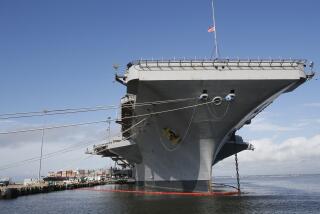Early Testing Could Have Spared Lives on Stark, Defense Aide Says
- Share via
WASHINGTON — An early test program to pinpoint ship danger points could have saved lives aboard the frigate Stark, which was hit May 17 by an Iraqi missile, a Defense Department official told Congress on Thursday.
James O’Bryon, assistant deputy undersecretary of defense for the department’s live-fire test program, also told a weapons acquisition panel that the Navy is considering improvements to reduce vulnerability in the FFG-7 class of ships, like the Stark.
O’Bryon said the incident, in which 37 seamen died and the vessel was heavily damaged, points up the importance of testing weapons systems and attempting to make improvements when weaknesses are found.
“As a result of that one shot, it’s my understanding the Navy has now established a program to improve the survivability of that ship,” O’Bryon said.
O’Bryon was asked if testing of the Stark class could have pointed to problems that would have led to improvements.
“It’s fair to say some of the lives would have been saved” with early testing, but he said details of the damage report were classified and he did not know what changes could have been made to improve survivability.
More to Read
Sign up for Essential California
The most important California stories and recommendations in your inbox every morning.
You may occasionally receive promotional content from the Los Angeles Times.








